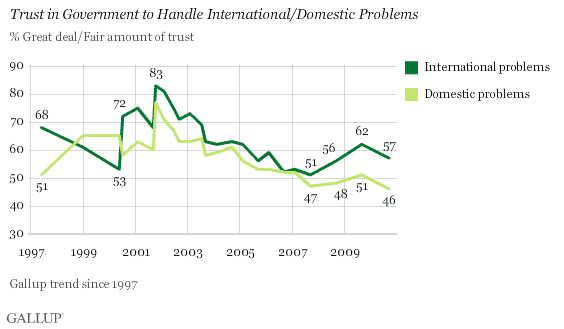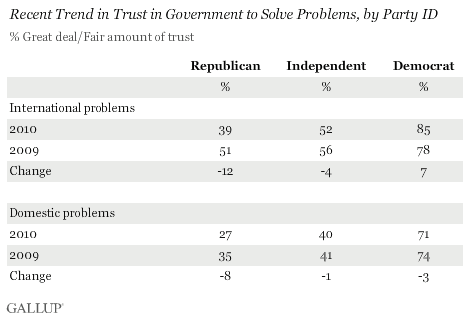PRINCETON, NJ -- Gallup's annual Governance survey finds 57% of Americans expressing a great deal or fair amount of trust in the U.S. government to handle international problems. That is down from 62% a year ago, but remains higher than the percentage trusting Washington to handle domestic problems, now at a record-low 46%.

The American people's trust in the federal government to handle international problems takes on particular relevance as President Barack Obama addresses the United Nations General Assembly in New York on Thursday.
Americans' confidence in the federal government to handle international problems has varied greatly over the past 13 years, from a high of 83% immediately after the 9/11 terrorist attacks in 2001 to 51% during the Iraq war in 2007. Confidence in the government on international problems also rose sharply in July 2000, coinciding with a major Palestinian-Israeli peace summit at Camp David sponsored by then-President Bill Clinton.
Trust in the government's handling of domestic matters has generally tracked below public trust on international matters but has mostly followed the same trajectory. In the last several years as the economy has struggled, fewer than half of Americans have trusted the government's handling of domestic problems (with only one exception).
The vast majority of Democrats today have a great deal or fair amount of confidence in the federal government on both policy dimensions, no doubt because the Democrats continue to control the White House and both houses of Congress. Accordingly, there has been little change in Democrats' views over the past year. A slight majority of independents express confidence in the government on international problems, while 40% have confidence in the government on domestic problems, also similar to 2009 in each case. By contrast, fewer than 4 in 10 Republicans today are confident in the government on either issue, with a 12 percentage-point drop since 2009 in their confidence on international problems.

Bottom Line
Americans' ratings of government efforts to solve international and domestic problems are now about where they were in early September 2008 -- in the last year of George W. Bush's term, but shortly before the Wall Street financial crisis that sent consumer confidence plummeting. Trust in the government on both international and domestic affairs was slightly higher in September 2009 -- Obama's first year in office -- but has since receded.
Other Gallup polling shows that Americans' perceptions of the United States' global reputation improved once Obama took office, after growing increasingly negative under Bush earlier this decade. At the same time, Gallup's World Affairs survey in February of this year found Americans still more dissatisfied than satisfied with the country's position in the world -- 63% vs. 35%. This mindset emerged in the early part of the Iraq war and has proved enduring since.
President Obama's speech this week at the United Nations presents an opportunity for him to articulate his vision for what the United States' role should be in world affairs and to perhaps restore public satisfaction with America's global position. To bolster Americans' confidence in the government on international problems, he may also want to use the speech to make the case that, working with the U.N., the U.S. has been successful in addressing several important global matters.
Results for this Gallup poll are based on telephone interviews conducted Sept. 13-16, 2010, with a random sample of 1,019 adults, aged 18 and older, living in the continental U.S., selected using random-digit-dial sampling.
For results based on the total sample of national adults, one can say with 95% confidence that the maximum margin of sampling error is ±4 percentage points.
Interviews are conducted with respondents on landline telephones (for respondents with a landline telephone) and cellular phones (for respondents who are cell phone-only). Each sample includes a minimum quota of 150 cell phone-only respondents and 850 landline respondents, with additional minimum quotas among landline respondents for gender within region. Landline respondents are chosen at random within each household on the basis of which member had the most recent birthday.
Samples are weighted by gender, age, race, education, region, and phone lines. Demographic weighting targets are based on the March 2009 Current Population Survey figures for the aged 18 and older non-institutionalized population living in continental U.S. telephone households. All reported margins of sampling error include the computed design effects for weighting and sample design.
In addition to sampling error, question wording and practical difficulties in conducting surveys can introduce error or bias into the findings of public opinion polls.
View methodology, full question results, and trend data.
For more details on Gallup's polling methodology, visit www.gallup.com.
